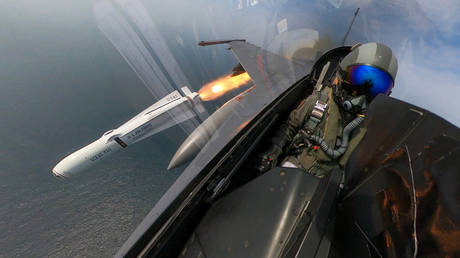ARTICLE AD BOX
Beijing is showing it’s willing to go to war over Taiwan, and it’s preparing for the inevitable consequences behind the scenes
Last week, William Lai was inaugurated president of the self-governing island of Taiwan. Lai, a pro-independence hardliner who advocates formal separation from China, made a provocative speech affirming the wayward province's sovereign existence.
China quickly responded by unleashing a military exercise around the island, which was, in Beijing’s own words, a drill on “seizing power” and forming an effective naval blockade. Although the drill was arguably pre-mediated and would have happened regardless, it was nonetheless the largest and most significant one China had held so far, bigger than the one which followed Nancy Pelosi’s controversial visit to the island in 2022.
In line with this, mainland China’s official rhetoric towards Taiwan also became noticeably more aggressive than ever before, with its foreign ministry spokesperson stating: “Taiwan independence forces will be left with their heads broken and blood flowing after colliding against the great … trend of China achieving complete unification.”
Beijing, of course, has always made its position on reunification with the island crystal clear, including never ruling out the use of force to do so, but in recent years this issue has intensified as the US has deliberately played up tensions with Taiwan in order to provoke China, and therefore manipulate the international paradigm towards a conflict between authoritarianism and democracy, a trend which dramatically accelerated following the outbreak of hostilities in Ukraine.
Read more Taiwan to get better weapons than Ukraine – Washington
Taiwan to get better weapons than Ukraine – Washington
But the question is: will China actually take this risk? This would be another significant moment in international relations, one which unlike Ukraine, could actually infer direct war with the US itself. Beijing has a lot to think about. The decision to re-take Taiwan by force would incur a colossal Western reaction which the US would quickly capitalize on to affirm unity with all its allies. First, that includes immediate decoupling measures, which China has long sought to resist. It would include a total embargo on sending microchips to China and other critical technology, an immediate exclusion of critical Chinese products from the markets of all involved, a potential seizing of Chinese-held currency assets, and a widespread censorship campaign which would blanket-ban TikTok and CCTV, amongst other things.
Politically, as the US has done with Ukraine and NATO membership, one would also expect it to move the goalposts through the consequences of such a conflict. The US would likely overtly abandon the One China Policy and then affirm the recognition of an independent Taiwan as its position, declaring non-recognition of Beijing’s Taiwan annexation, should it succeed. This all means the political and economic costs for China to engage in such an effort would be huge. The question therefore is, how much must the benefits outweigh the costs for Beijing to ultimately decide on invading?
China is, in fact, strategically preparing for this scenario more than people realize. First, a potential war scenario is a critical factor in the direction the country’s economy is taking. China is pursuing an increasingly massive indigenization drive for chips, technological supply chains and other critical goods, seeking to phase out the need for foreign imports. The US has long sought to use the semiconductor supply chain, and China’s dependence on Taiwan for a great deal of that chain, as a strategic chokepoint in order to cripple China’s economic and military development. Beijing has been investing aggressively to try and break out of this containment and wean itself off such dependency as fast as possible, all while simultaneously seeking to advance its own capabilities.
Read more The West is one step away from openly backing Taiwan separatism
The West is one step away from openly backing Taiwan separatism
Secondly, China has long been preparing for the possibility that the US will try and impose a full-blown naval embargo on it, as unlikely as this may be. The Pentagon has been tasked with preparing a study on how such an embargo would be possible. The goal, of course, would be to cripple China militarily by depriving it of access to foreign fuel supplies, again attempting to use its lack of energy independence, owing to its population size as another chokepoint. Beijing’s biggest response to this has been to build the Belt and Road initiative, and use strategic partners such as Pakistan to create alternative maritime and commercial routes which effectively avoid its naval peripheral regions that have been increasingly militarized by the US. This also includes increasing strategic and energy integration with Russia.
When these things are viewed in context, China is certainly preparing for the contingency of a war, as well as laying down the economic adjustments that would be needed in such a scenario. However, it also remains true that at this point in time, Xi Jinping has not given up on diplomacy, and as much as he retains an incentive to economically develop the country through integration with Western markets, he is not likely to take such a massive decision. However, we must be honest that with the way the world is changing, this door is increasingly closing, and it is obvious to most people that on the current trajectory, Taiwan has absolutely no interest whatsoever in unification. So what options does China have left with Taipei? It may be damned if it does and damned if it doesn’t.
.png)
 5 months ago
10
5 months ago
10








 English (US)
English (US)